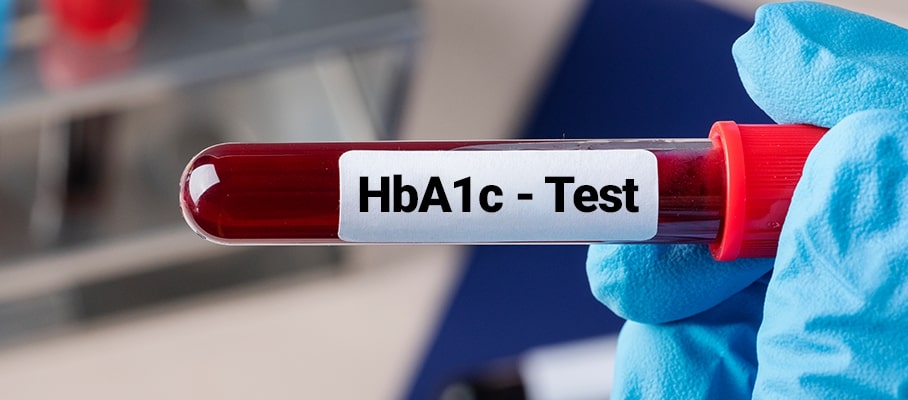HbA1c test importance
Could you be at risk of diabetes? Keep an eye on diabetes risk factors
Diabetes is a sneaky disease. While this health condition needs no introduction in the present times, about 1 in 2 people who have diabetes are unaware of their condition! Diabetes has emerged as a global public health threat. It is estimated that three-quarters of the world’s 300 million adults with diabetes will be in non-industrialized countries by the year 2025, and almost a third in India and China alone. In addition, as per several researchers, Indians are prone to develop diabetes, owing to certain risk factors. How aware are you of the factors that push you closer to diabetes? Let us apprise you of the most important and common factors that increase your chance of getting diabetes. (Also, please note that diabetes in the context of this article refers to type 2 diabetes. Diabetes doesn’t always give a warning: Timely tests are important Most people who get diabetes first develop prediabetes also called borderline diabetes. This is a condition when your blood sugar levels are higher than normal but not high enough to be called diabetes. As per a study, the estimated prevalence of prediabetes in India is 14%. Contrary to the popular belief that diabetes can be easily diagnosed with the symptoms, prediabetes can be asymptomatic unless it is turned into a full-blown diabetes case. The symptoms of diabetes might develop gradually, and can be missed very often. That is why getting yourself tested for high blood sugar levels is extremely important. While a fasting blood sugar level below 100 mg/dL is considered normal, a level from 100 to 125 mg/dL is considered prediabetes. You can also get an HbA1c test done. That shows the average blood sugar levels for the last 2-3 months. An HbA1c level between 4-5.6% is considered healthy and 5.7- 6.4% denotes prediabetes, level 6.5% or higher indicates diabetes. Remember, prediabetes is completely reversible without medicines if you get diagnosed on time and adopt lifestyle changes. Major risk factors of diabetes include: Family history: Your risk increases if your parent or sibling has diabetes. Your lifetime risk for getting (type 2) diabetes goes up to about 70% if both parents have it. If one parent is affected, there is around a 40% chance for individuals to develop diabetes. Excessive body fat: Your body cells take up glucose or sugar and utilize it for various functions. The uptake of sugar by the body cells is regulated by a hormone called insulin. But, if you have more free fatty acids in your cells, they get resistant to insulin and the sugar uptake is reduced. This results in excessive sugar in your blood. Insulin resistance is the main cause of diabetes that affects about 9% of people globally. Lack of physical activity: The less active you are, the greater your risk to get diabetes. Physical activity helps you control your weight, increases glucose uptake by the body cells for energy, and makes cells more sensitive to insulin. Age: Even in the absence of other risk factors, the risk of developing diabetes increases with the advancing age. A matter of grave concern is more younger adults are facing the brunt of this chronic disease due to unhealthy lifestyle practices. Cases have seen a rise in children as well owing to an increase in childhood obesity. Gestational diabetes: This is a condition in which otherwise healthy women are affected with high blood sugar levels during pregnancy. For women who develop gestational diabetes, the risk of developing prediabetes and (type 2) diabetes increases. Polycystic ovary syndrome (PCOS): This must have a ring a bell. Actually, PCOS has emerged as a major health problem for women in recent times. This is a condition that affects a woman’s hormone levels and causes a range of problems including weight gain, unwanted body hair, acne, infertility, irregular periods, etc. Since PCOS causes deranged hormone levels, it is important to check hormonal parameters including testosterone, sex hormone-binding globulin (SHBG), and anti-mullerian hormone (AMH). Your doctor will correlate the results with the symptoms to arrive at a diagnosis. The underlying cause why PCOS can put you at risk of diabetes is assumed to be insulin resistance of body cells. If glucose is not being used by the body cells, it results in high blood sugar levels. High blood pressure. Diabetes and high blood pressure are closely related. Having high blood pressure over 140/90 mmHg is linked to an increased risk of diabetes. Unhealthy cholesterol levels: Having low levels of good cholesterol (high-density lipoprotein) or high levels of bad cholesterol (low-density lipoprotein) results in high free fatty acids in body cells. This increases the risk of developing diabetes. Triglycerides are another type of fat carried in the blood. People with high levels of triglycerides have an increased chance of diabetes. A lipid profile test lets you know what your cholesterol and triglyceride levels are. Keep in mind: While certain risk factors like age and family history are beyond your control, lifestyle factors such as obesity and exercise can be managed with a bit of health awareness and some sincere efforts. Take charge of your health with regular health tests and stay one step ahead of chronic conditions like diabetes.
HbA1c Test for Diabetes: Importance, Target and Results
HbA1c test stands for glycated or glycosylated hemoglobin test. This test helps measure average blood sugar levels for the past 3 months. This test is essential for every person who has diabetes. Other names of this test are glycohemoglobin test, A1c test, or simply A1c. Hemoglobin is the protein in the red blood cells that help in transportation of oxygen across the body. Sugar (or glucose) present in the blood combines with one type of hemoglobin (hemoglobin A), this combination molecule is called glycated hemoglobin. A red blood cell lives up to 120 days, or 4 months. Hence, measuring this combination molecule gives a fair estimate of your blood sugar levels in the last 2-3 months. Keep your diabetes in check with an HbA1c test. Importance of HbA1c Test Do you regularly measure your fasting and after meal blood sugar to keep a check on your diabetes? Think that is enough? Not actually! Though the fasting and post meal tracking of blood glucose is important, these tests can only check your blood sugar at a certain point of time. Their results might vary depending on what you had eaten over the last night or in the previous meal. However, the HbA1c test looks at the 3-month data and cannot be biased. For persons having diabetes, HbA1c numbers give a fair idea of how controlled their diabetes is. As per scientific evidence, having a smaller HbA1c number means lesser risk of developing complications due to diabetes. all diabRaised HbA1c value has also been regarded as an independent risk factor for heart disease and stroke in people with or without diabetes. Why is the HbA1c test done and significance of it? The HbA1c test is used for diagnosis as well as monitoring purposes. Your doctor suggests an HbA1c test to see whether your diabetes is controlled or not. Pre-diabetics, people having borderline diabetes, are also advised to get tested to check how stable their blood sugar levels are. All diabetic patient should know the significance of hba1c test. Frequency of getting tested In general, people having diabetes and pre-diabetes should get their HbA1c tested every 3 months. If you are healthy but have a family history of diabetes or think your lifestyle makes you prone to develop diabetes, you should get an HbA1c test done every 6 months. You can consult a doctor on how frequently you should take a test for your health condition. HbA1c Results The results of the A1c test are presented as a percentage. The test result shows the amount of hemoglobin that glucose has bound to in your blood. For diagnostic purposes, the test results may be as follows: Normal/ Healthy: Below 5.7% Pre-diabetes: 5.7–6.4% Diabetes: 6.5% or more There are certain factors and some medical conditions that can change the HbA1c result slightly and even lead to a higher reading. Some conditions that can cause a false A1c number include: Liver disease Kidney disease Recent blood loss or transfusion Low iron levels Certain blood-related conditions Your doctor is the best guide to analyse the results. HbA1c Target levels A healthy person who does not have diabetes should target for an HbA1c score below 5.7 percent. If a person has an HbA1c score of 6.5 percent or higher, it’s likely that he /she has diabetes. During treatment for diabetes, different people will have different targets, based on factors such as their age and medicines they are taking. In general, diabetics might be asked to keep their HbA1c result below 7 percent. Older adults having diabetes and diabetics who might also be at risk of low sugar levels (hypoglycemia), can be recommended an HbA1c number of around 8%. Test preparation for HbA1c Unlike fasting or post meal blood sugar tests, no special preparation is needed for an HbA1c test. You do not need to fast. You can give a test sample at any time of the day. Also, do not miss your medicines on the day of getting tested. COVID-19 and HbA1c The entire pandemic situation has made managing diabetes well more important than ever for people having diabetes. HbA1c gives you a sneak peek into how well your blood glucose has been doing over the past 2-3 months. Look for trusted labs and safe services when you have to take an HbA1c test. Have to get tested and not sure where to get it done? Book an HbA1c test online and get tested within the comfort of your home.
 Home Visit
Home Visit Upload
Upload
















 WhatsApp
WhatsApp